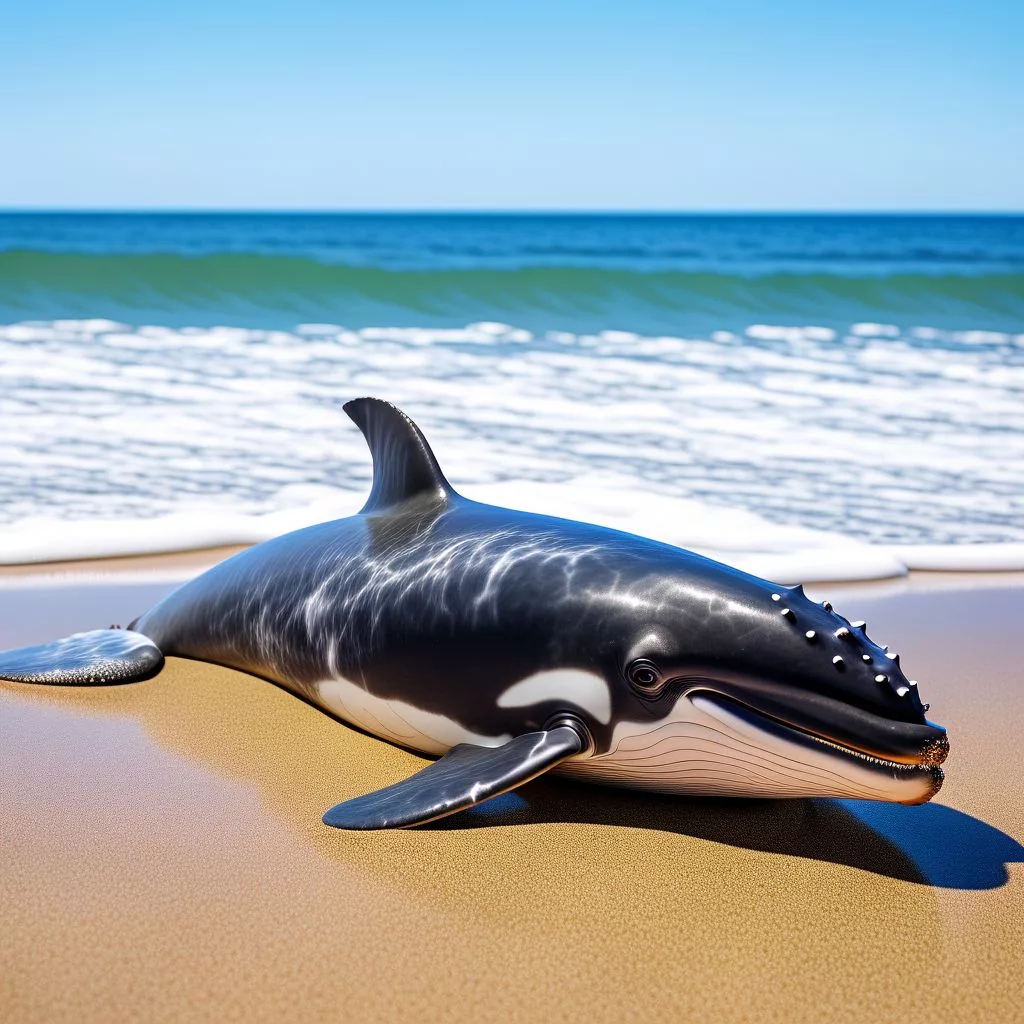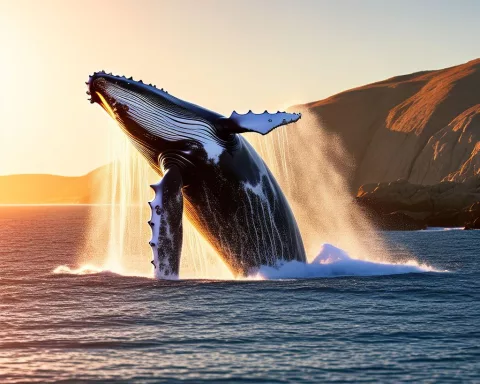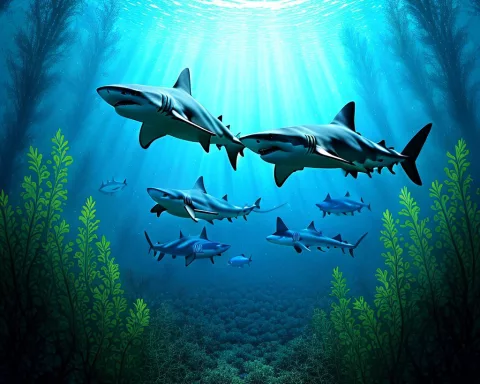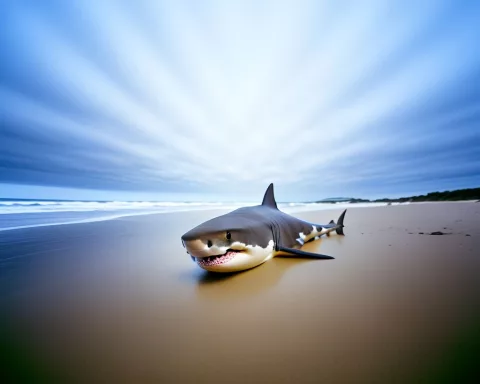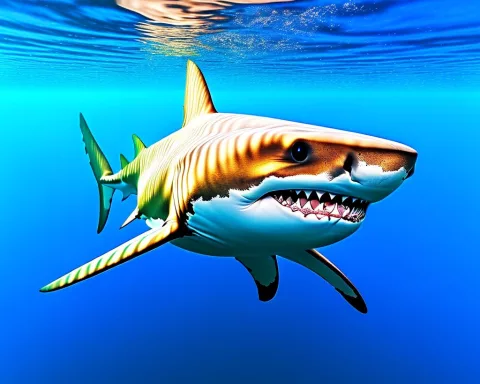On a quiet morning at Hartenbos Beach, a massive beaked whale was found stranded on the sand, shocking early walkers and joggers. Despite the urgent efforts of marine advocates using drones to guide it back to the ocean, the whale kept returning to shore, showing it was in distress. Sadly, the team had to make the heartbreaking decision to euthanize the whale to end its suffering. This tragic event reminds us of the fragility of marine life and the urgent need for conservation efforts to protect these mysterious creatures and their habitats.
What happened to the beaked whale at Hartenbos Beach?
A beaked whale was found stranded on Hartenbos Beach, prompting urgent efforts from marine advocates to return it to the ocean. Despite their attempts, the whale repeatedly returned to shore, leading to its heartbreaking euthanization due to distress. This incident highlights the fragility of marine ecosystems.
A Shocking Discovery
In the early dawn, the peaceful coastline of Hartenbos Beach in Mossel Bay witnessed an unexpected and sorrowful event. Walkers and joggers, starting their daily routines, stumbled upon an extraordinary and alarming sight—a massive beaked whale stranded on the sand. Immediate concern rippled through the gathered crowd, from casual beachgoers to dedicated marine enthusiasts, as they realized the gravity of the situation.
The Call to Action
Word of the stranded whale spread rapidly, and a group known as Drone Fanatics quickly mobilized. This dedicated collective of drone operators and marine life advocates descended on the beach with urgency. They understood the significance of a beaked whale in shallow waters, as these creatures typically inhabit the deep ocean, diving to great depths to feed on squid and other deep-water fish. The group launched an effort to guide the whale back to its natural habitat, with drones capturing every detail of their painstaking attempt.
Despite their valiant efforts, the whale repeatedly returned to the shore. It soon became clear that this was not a simple case of disorientation. The whale’s relentless beaching indicated a more severe underlying issue. In a heartfelt statement, Drone Fanatics expressed their despair: “We did everything we could by guiding the whale back to the ocean, but it came back again and again. Sadly, there was no other option left but to euthanize the animal, as it appeared to be in distress.”
The Enigmatic Beaked Whale
Masters of the Deep
Beaked whales, particularly Cuvier’s beaked whale, are among the ocean’s most mysterious and elusive creatures. Known for their remarkable diving abilities, these whales hold the record for the longest mammalian dive, with one individual remaining submerged for over three and a half hours. Their deep-sea foraging and infrequent surfacing events make them one of the least understood species in marine biology, presenting significant challenges for researchers trying to study their behavior and ecology.
A Rare Appearance
The sight of a beaked whale on the beach served as a poignant reminder of the ocean’s harsh realities and the vulnerability of its inhabitants. Witnesses to the scene reflected on the enigmatic existence of these creatures, which spend their lives in the shadowy depths far from human observation. The distressing presence of the whale on the shore sparked a broader conversation about the dangers these animals face, highlighting the fragility of marine ecosystems.
Historical Fascination
Historically, beaked whales have captivated the imaginations of scientists and sailors alike. In the 19th century, tales of these deep-diving giants found their way into maritime lore, often surrounded by an aura of mystery and awe. Their ability to navigate the pitch-black ocean depths using echolocation is a testament to their extraordinary adaptations. This sophisticated biological sonar system enables them to hunt and traverse an environment where even the faintest light cannot penetrate.
Modern Threats and Conservation Efforts
New Challenges
In the modern era, beaked whales face new threats that compound their ancient struggles. Ocean noise pollution from shipping, military sonar, and industrial activities disrupt their echolocation abilities, leading to disorientation and, in some tragic cases, strandings. The incident in Mossel Bay underscores the urgent necessity for increased research and conservation efforts to protect these enigmatic marine mammals.
The Call for Research
The story of the beached whale at Hartenbos Beach serves as a call to action. It underscores the importance of understanding and preserving the delicate balance of marine ecosystems. The deep-sea realm, home to beaked whales and countless other species, remains one of the last frontiers for scientific exploration. Each incident like this underscores the pressing need for comprehensive research to unravel the complex factors contributing to such tragic events.
Dedicated Advocates
This incident also highlights the relentless dedication of individuals and groups like Drone Fanatics, who tirelessly strive to protect marine life. Their efforts, though sometimes met with tragic outcomes, are vital in raising awareness and driving positive change. The story of the stranded whale stands as a testament to their commitment and the collective responsibility we all share in safeguarding our planet’s oceans.
Reflection and Action
The Ocean in Art and Literature
The plight of the beached whale evokes themes that have long inspired art and literature. The Romantic poets of the 18th and 19th centuries often depicted the ocean as a symbol of the sublime, representing both beauty and terror. The tragic event at Hartenbos Beach stirs similar feelings of wonder and sorrow, reminding us of the ocean’s dual nature and the profound impact it has on human emotions.
A Broader Perspective
In the broader narrative of marine conservation, the beaked whale represents the unseen and unknown. Their largely hidden lives challenge the perception of the ocean as an inexhaustible resource. As we strive to understand the intricate web of life beneath the waves, the need for comprehensive research becomes ever more apparent. This understanding is crucial in addressing the myriad of factors leading to such heartbreaking incidents.
Commitment to the Future
The tragic end of the whale at Hartenbos Beach is not just a story of loss but also a powerful call for continued conservation efforts. It emphasizes the significance of marine ecosystems and the need to protect these remarkable creatures and their habitats. Each discovery in the deep-sea realm brings us closer to understanding the intricate balance of life that exists beneath the surface, urging us to act with greater responsibility and care.
In conclusion, while the story of the beaked whale’s stranding is somber, it serves as a potent reminder of the importance of marine conservation and research. The deep-sea remains one of the most intriguing and least understood areas of our planet. Each new finding helps unravel the mysteries of the ocean, bringing us closer to preserving the delicate ecosystems and ensuring that future generations can marvel at their beauty and complexity.
FAQ: The Tragic Morning at Hartenbos Beach
What happened to the beaked whale at Hartenbos Beach?
A beaked whale was found stranded on Hartenbos Beach, prompting urgent efforts from marine advocates to return it to the ocean. Despite their attempts, the whale repeatedly returned to shore, leading to its heartbreaking euthanization due to distress. This incident highlights the fragility of marine ecosystems.
Why are beaked whales considered mysterious creatures?
Beaked whales, particularly Cuvier’s beaked whale, are among the ocean’s most mysterious species due to their remarkable diving abilities and elusive nature. They can dive for over three and a half hours and spend most of their lives in deep waters, making them difficult to study and understand.
What efforts were made to save the stranded whale?
A dedicated group called Drone Fanatics mobilized quickly to guide the stranded whale back to its natural habitat using drones. Despite their valiant efforts to return the whale to the ocean, it continued to beach itself, indicating a significant underlying issue.
What are the modern threats faced by beaked whales?
Beaked whales face numerous modern threats, including ocean noise pollution from shipping, military sonar, and industrial activities. These disrupt their echolocation abilities, leading to disorientation and increasing the risk of strandings.
How does the incident at Hartenbos Beach highlight the need for marine conservation?
The heart-wrenching event at Hartenbos Beach serves as a wake-up call for the urgent need for increased research and conservation efforts. It emphasizes the delicate balance of marine ecosystems and the threats these enigmatic creatures face in today’s environment.
What can individuals do to support marine conservation efforts?
Individuals can support marine conservation by raising awareness about the challenges faced by marine life, participating in local conservation initiatives, reducing plastic use, and advocating for policies that protect marine ecosystems. Every action contributes to the health of our oceans and the creatures that inhabit them.

